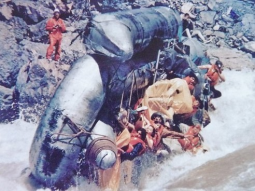Are Your Words Derailing Your Conversations?

We’ve all said some things we regret. Why do we do it? Sometimes we don’t stop to consider our audience. Other times we’re tired, frustrated, or overwhelmed, and our emotions get the best of us.
Are You Leading by Example—or Just Talking About It?

Sometimes our values are values in theory, rather than values in fact. You can tell whether company values are supported and adopted by how people act.
Rose, a manager in HR, was asked to interview a person for an opening on their team by her director. After concluding the interview, Rose indicated that the candidate would not be a good fit for their company.
Seeing Ourselves Clearly: Overcoming Leadership Blind Spots
.jpeg)
I have always been fascinated by how unaware many people seem to be of how they come across or how their behavior impacts others.
5 Tips for Handling Being Ghosted

This ghosting thing happens quite frequently to me. Company representatives call and inquire about the cost of my training and coaching services.
What’s with All This Disengagement?

I was truly disappointed in January when I read the Gallup Engagement Report.
A Thanksgiving Surprise

Have you ever made something out of nothing?
That’s what we did, and it was amazing.
Years ago, about this time, I was completing a six-month experiential training class. On the Saturday before Thanksgiving, my group of about 12 people were given the task of creating a Thanksgiving meal for a needy family without using any money of our own. We were to rely solely on the generosity of others.
Difficult Conversations: What to Know Before You Go 9 Tips to Improve Conversational Effectiveness

I recently spoke at a large company. Afterwards, two executives asked if I would be willing to coach them in dealing with one of their team members. I agreed.
After visiting about the situation, I discovered that the employee in question had a toxic attitude about work, had not been performing the required tasks for their position, and was harboring ill feelings for the supervisor who was hired rather than them. When I asked how long this had been going on, I was told that it had been two years since this employee had been a committed, passionate, and engaged employee.
What Keeps You from Holding Difficult Conversations?

Sometimes we are our own worst enemy.
The way our brain processes and perceives incoming information can be a major obstacle. There are three distinct parts of our brain that play a big role in every conversation that you want to hold: the unconscious, subconscious, and conscious brains.
Is it Time to Elevate Your Emotional Intelligence?

My first job in corporate America was in a human resources department. We received a call from a hotel in a major city, asking us never to book a certain executive from our company in their hotel again.
14 Tips for Improving Feedback

A few weeks ago, I was watching a college basketball game. At half time, I found myself looking through a variety of articles that popped up on my phone. An article on feedback caught my eye
Six Character Traits to Increase Authenticity

Patty, as the office manager, was tasked with giving feedback to those that were performing poorly. Amber, who had started missing deadlines, been on the phone a lot, and had been coming in late for work, was identified as someone who Patty had decided she needed to talk to.
How Does Your Fear Hold You Back?

I love and hate this picture of a rafting trip through the Grand Canyon.
What do I love about it?
The photographer captured the exact moment that a lateral wave hit the raft at just the right angle and speed to tip it up on the left outside tube, allowing it to balance for just a few seconds before the raft flipped completely over.
How Can You Create a Culture of Candor?

One of the biggest challenges that any leader faces is to ensure that employees feel comfortable speaking up when they have difficult issues to discuss Although such topics that are difficult to talk about, they can have a significant impact on the workplace, such issues as harassment, discrimination, or concerns about the company's culture.
Are You Actively Retaining and Attracting New Talent During the Great Resignation?

12 Questions for Assessing the Employee Experience
Have You Forgotten How to Connect with People?

Angie had been looking to create a foursome for a golf tournament that her company was holding. She had been having difficulty recruiting the final two participants needed to compete in the company tournament.




.jpeg)











